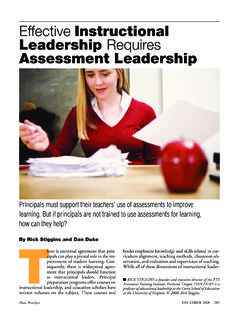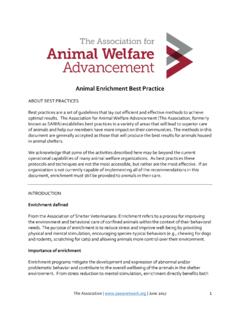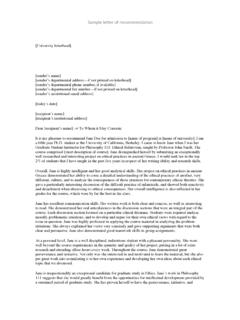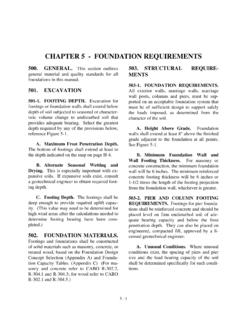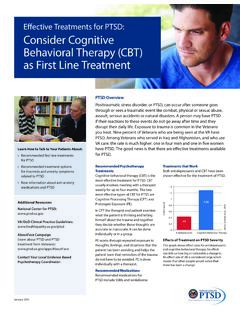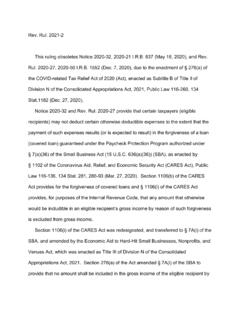Transcription of The Pedagogy of Poverty Versus Good Teaching
1 This article was originallypublished as The Pedagogy of Poverty VersusGood Teaching byMartin Delta Kappan73, no. 4 (December1991): edition exclusiveKappanClassicDeepen yourunderstanding ofthis article withquestions andactivities on pagePD 16 of thismonth s KappanProfessionalDevelopmentDiscussion Guideby Lois BrownEaston, free tomembers in the digital edition is a minor issue like improving the quality of urban Teaching generally overlooked by the popu-lar reform and restructuring strategies? There are several possibilities. First, we assume that we know whatteaching is, that others know what it is, that we are discussing the same thing when we use the word, andthat we would all know good Teaching if we saw it. Second, we believe that, since most teachers cannot bechanged anyway, there must be other, more potent, teacher-proof strategies for change.
2 Third, why botherwith Teaching if research shows that achievement testscores of poor and minority youngsters are affectedprimarily by their socioeconomic class; affectedsomewhat by Head Start, school integration, and hav-ing a strong principal; and affected almost not at allby the quality of their teachers?THE Pedagogy OF POVERTYAn observer of urban classrooms can find exam-ples of almost every form of Pedagogy : direct instruc-tion, cooperative learning, peer tutoring, individual-ized instruction, computer-assisted learning, behav-ior modification, the use of student contracts, media-assisted instruction, scientific inquiry, lecture/discus-sion, tutoring by specialists or volunteers, and eventhe use of problem-solving units common in progres-sive education.
3 In spite of this broad range of options,however, there is a typical form of Teaching that hasbecome accepted as basic. Indeed, this basic urbanstyle, which encompasses a body of specific teacheracts, seems to have grown stronger each year since Ifirst noted it in 1958. A teacher in an urban school ofthe 1990s who did notengage in these basic acts asthe primary means of instruction would be regardedas deviant. In most urban schools, not performingthese acts for most of each day would be consideredprima facie evidence of not N2 Kappan 81 MARTIN HABERMANis a distinguished professor emeritus of curriculum and instruction at the University of Pedagogy of PovertyVersus good TeachingIt will be formidably difficult to institutionalize new forms of Pedagogy for the children of Poverty , but it isworthwhile to define and describe such Martin HabermanThinkstock/iStockphotosThe Teaching acts that constitute the corefunctions of urban Teaching are.
4 Giving information, Asking questions, Giving directions, Making assignments, Monitoring seatwork, Reviewing assignments, Giving tests, Reviewing tests, Assigning homework, Reviewing homework, Settling disputes, Punishing noncompliance, Marking papers, and Giving basic menu of urban teacher func-tions characterizes all levels and subjects. Aprimary teacher might give information byreading a story to children, while a highschool teacher might read to the class from abiology text. (Interestingly, both offer simi-lar reasons: The students can t read forthemselves, and They enjoy being readto. ) Taken separately, there may be nothingwrong with these activities. There are occa-sions when any one of the 14acts might have a beneficial ef-fect.
5 Taken together and per-formed to the systematic exclu-sion of other acts, they have be-come the pedagogical coin ofthe realm in urban constitute the pedagogyof Poverty not merely whatteachers do and what young-sters expect but, for differentreasons, what parents, the com-munity, and the general public assume teach-ing to to this system is a set of out-of-class teacher acts that include keepingrecords, conducting parent conferences, at-tending staff meetings, and carrying out as-sorted school duties. While these out-of-classfunctions are not directly instructional, theyare performed in ways that support the ped-agogy of Poverty . Since this analysis dealswith the direct interactions characteristic ofurban teachers and their students, I will limitmyself to a brief comment about how each ofthese out-of-class functions is typically con-ceptualized and performed in urban settings.
6 Record-keeping is the systematicmaintenance of a paper trail to protectthe school against any future legalaction by its clients. Special classes,referrals, test scores, disciplinaryactions, and analyses by specialists mustbe carefully recorded. This slant is thereason that teachers are commonlyprejudiced rather than informed byreading student records; yet the systemregards their upkeep as vital. (Inteacher preparation, neophytes areactually taught that student records willreveal such valuable information asstudents interests!) Parent conferences give parents whoare perceived as poorly educated orotherwise inadequate a chance to havethings explained to them. Staff meetings give administratorsopportunities to explain things toteachers. Assorted school duties are essentiallypolice or monitoring activities thatwould be better performed by Pedagogy of Poverty appeals to sev-eral constituencies:1.
7 It appeals to those who themselves didnot do well in schools. People who havebeen brutalized are usually not richsources of compassion. And those whohave failed or done poorly in school donot typically take personal responsibilityfor that failure. They generally find iteasier to believe that they would havesucceeded if only somebody had forcedthem to It appeals to those who rely on commonsense rather than on thoughtful is easy to criticize humane anddevelopmental Teaching aimed ateducating a free people as mere permissiveness, and it is well knownthat permissiveness is the root causeof our nation s educational It appeals to those who fear minoritiesand the poor. Bigots typically becomeobsessed with the need for It appeals to those who have lowexpectations for minorities and thepoor.
8 People with limited visionfrequently see value in limited andlimiting forms of Pedagogy . They82 Kappan October 2010 the Pedagogy ofpoverty will notforce the learning oflow-level skills, howcan it be used tocompel genuinethinking?Whenever students are involvedin planning what theywill be doing, it islikely that goodteaching is going on. Whenever studentsare involved withexplanations ofhuman differences, good Teaching isgoing that at-risk students are servedbest by a directive, It appeals to those who do not know thefull range of pedagogical optionsavailable. This group includes mostschool administrators, most businessand political reformers, and are essentially four syllogisms thatundergird the Pedagogy of Poverty . Their logic runs something like Teaching is what teachers is what students , students and teachersare engaged in different Teachers are in charge andresponsible.
9 Students are thosewho still need to developappropriate behavior. Therefore,when students follow teachers directions, appropriate behavior isbeing taught and Students represent a wide range ofindividual differences. Manystudents have handicappingconditions and lead debilitating homelives. Therefore, ranking of some sort isinevitable; some students will end up atthe bottom of the class while others willfinish at the Basic skills are a prerequisite forlearning and living. Students are notnecessarily interested in basic , directive Pedagogy must beused to ensure that youngsters arecompelled to learn their basic skillsREFORM AND THE Pedagogy OF POVERTYU nfortunately, the Pedagogy of povertydoes not work. Youngsters achieve neitherminimum levels of life skills nor what theyare capable of learning.
10 The classroom at-mosphere created by constant teacher direc-tion and student compliance seethes with pas-sive resentment that sometimes bubbles upinto overt resistance. Teachers burn out be-cause of the emotional and physical energythat they must expend to maintain their au-thority every hour of every day. The peda-gogy of Poverty requires that teachers whobegin their careers intending to be helpers,models, guides, stimulators, and caringsources of encouragement transform them-selves into directive authoritarians in order tofunction in urban schools. But people whochoose to become teachers do not do so be-cause at some point they decided, I want tobe able to tell people what to do all day andthen make them do it!

